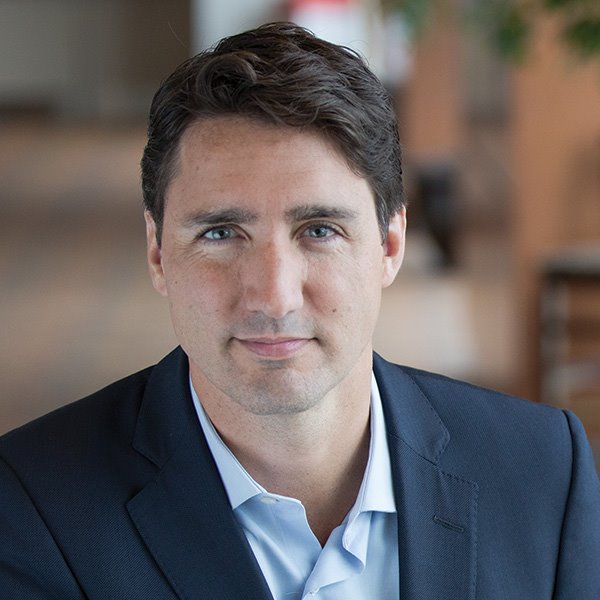
OTTAWA –The past, present and potential future of the federal Conservative party offered their Liberal rivals an unprecedented show of solidarity Sunday on the eve of Prime Minister Justin Trudeau’s first meeting with U.S. President Donald Trump.
The olive branch, a departure from the usual cut and thrust of party politics, reflects a shared understanding that crosses the traditional partisan divide: that Canadian jobs depend on a strong relationship with the U.S. regardless of who might be residing in the White House.
Recalling one of the tightest relationships between a prime minister and an unpopular president, Derek Burney – a confidante of former Progressive Conservative prime minister Brian Mulroney – called his former boss’s relationship with Ronald Reagan “the prime example of getting along with Americans,” one that could prove useful for Trudeau on Monday.
Burney served as chief of staff to and U.S. ambassador for Mulroney, who he said has had “a number of discussions” with Trudeau about Trump, the former prime minister’s longtime neighbour in Palm Beach, Fla.
To those Conservatives who might question why he and Mulroney want to help Trudeau, Burney has a simple answer.
“This relationship is above partisanship. It’s in the national interest,” he said in an interview Sunday.
“We have some experience that we think is relevant and so we’re happy to make use of it, if the government wants it. I see that as being Canadian.”
Burney applauded the letter interim Conservative leader Rona Ambrose sent Sunday to Trudeau calling for bipartisan efforts in building a relationship with the Trump administration.
Ambrose offered the services of several Tory caucus members, including former trade minister Ed Fast and former agriculture minister Gerry Ritz, both of whom had extensive stateside experience while in government and forged strong contacts with American lawmakers.
“I am sure that we can agree that as leaders of our respective parties, our No. 1 priority is to create Canadian jobs,” Ambrose wrote.
“As we move forward, the official Opposition is committed to playing a constructive role because our constituents are counting on us to keep our economy moving forward.”
Trudeau’s spokeswoman Kate Purchase said the government welcomed Ambrose’s letter, and that he “looks forward to working with all parties and all Canadians to build on our profound shared economic interests.” She said Ambrose also had a “productive conversation” in Washington last month with Canadian ambassador David MacNaughton.
Foreign Affairs Minister Chrystia Freeland has written to Ambrose and NDP Leader Tom Mulcair to seek their collaboration, said Purchase.
Freeland, along with Defence Minister Harjit Sajjan, Public Safety Minister Ralph Goodale, Transport Minister Marc Garneau and Finance Minister Bill Morneau will be in Washington with Trudeau on Monday.
Ambrose’s gesture marked a break from the normally raucous confrontations between the Liberals and Conservatives.
This past week, Ambrose savaged the government for agreeing to provide $372.5 million to Montreal aerospace firm Bombardier. If that’s any indication of how the government plans renegotiate the North American Free Trade Agreement, a key Trump priority, “we are screwed,” she jeered.
Even Conservative party leadership hopeful and “Shark Tank” reality-TV star Kevin O’Leary declined a U.S. TV interviewer’s invitation Sunday to take an easy bite out of Trudeau.
Asked on MSNBC whether Trudeau’s recent Twitter posting defending Canada’s acceptance of Syrian refugees was “complete in-your-face policy interference” with Trump’s now-failed executive order banning people from seven mainly Muslim countries, O’Leary demurred.
“He’s making a statement that all Canadians believe,” he said. “I myself am the son of a Lebanese and Irish immigrant. So if there was a wall around Canada, I wouldn’t exist.”
O’Leary parroted the talking points that Trudeau and his cabinet have been repeatedly reciting – actually, he inflated them slightly – that 9.5 million American jobs depend on Canada and 38 U.S. states have Canada as their top customer. (The Liberals have been saying it is nine million jobs and 35 states)
Canadian prime ministers have no more important responsibility than to maintain strong economic relations with the United States, no matter how unpalatable the president, said Ian Lee, a professor at the Sprott School of Business at Carleton University in Ottawa.
It would be “childish and juvenile and irresponsible” for anyone to think Trudeau’s job is to go to Washington to preach Canadian values to Trump, Lee said.
“This is a profound misunderstanding of history, a profound misunderstanding of the role of the prime minister of Canada.”
A new NAFTA, a possible import tax and “Buy American” protectionism are all on the table for Trump, all of which would be catastrophic for Canada, Lee added, so Trudeau must make sure Canada is exempted.
David Wilkins, a former U.S. ambassador who served under George W. Bush, another unpopular-in-Canada president, said Trudeau and his cabinet served Canada well by avoiding the temptation to “jump into the fray” and criticize Trump during and after the fractious presidential election.
“Relationships matter and it’s important to be respectful to each other and develop a good strong, personal relationship,” said Wilkins, who initially supported Bush’s brother, Jeb, for president before Trump prevailed.
“Going into this meeting, the objective is to make a good relationship even better, make a great trading relationship even stronger.”
Burney said beyond any shared economic imperatives, Trump and Trudeau could potentially build on a couple of other similarities: both were underdogs in their respective election campaigns, and both have become savvy users of social media.
“I think Trump, as a guy who’s ratings conscious, popularity conscious, he’s going to be aware that there’s something there, and that can’t hurt.”